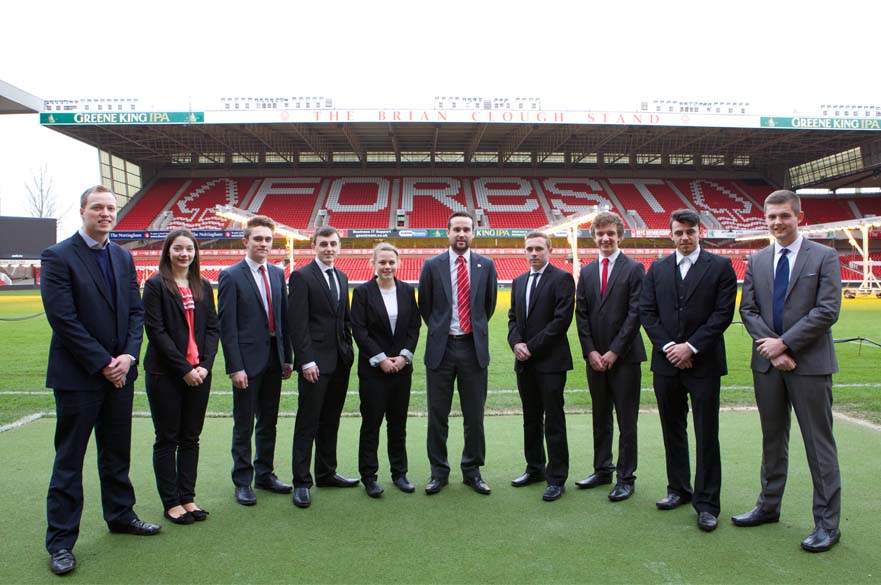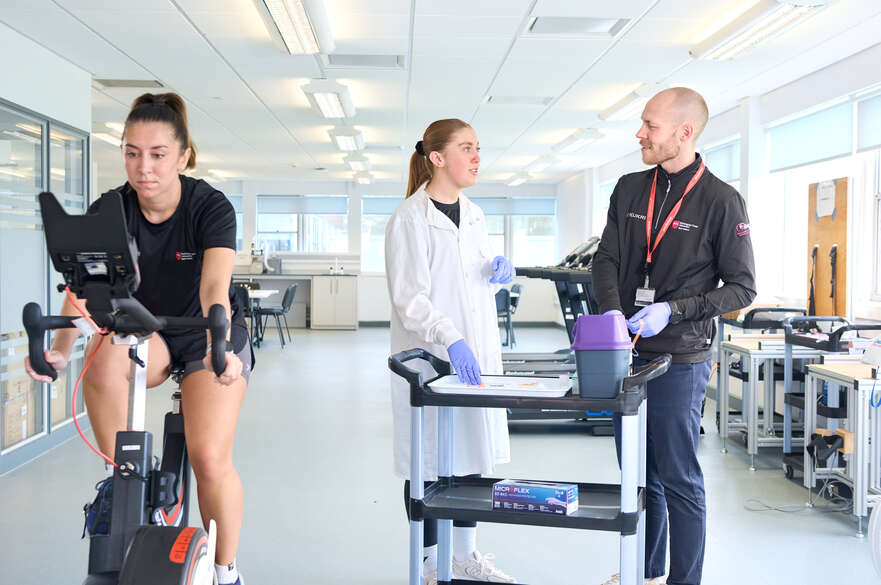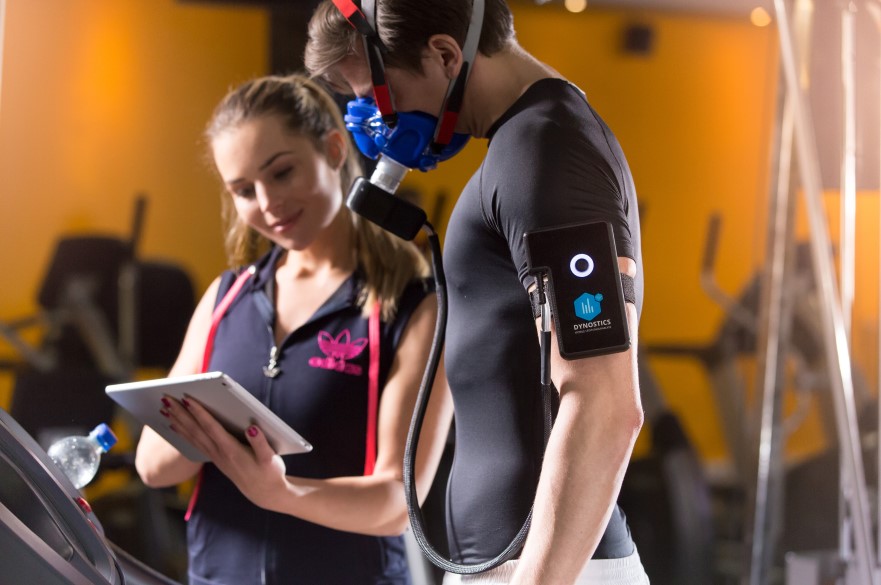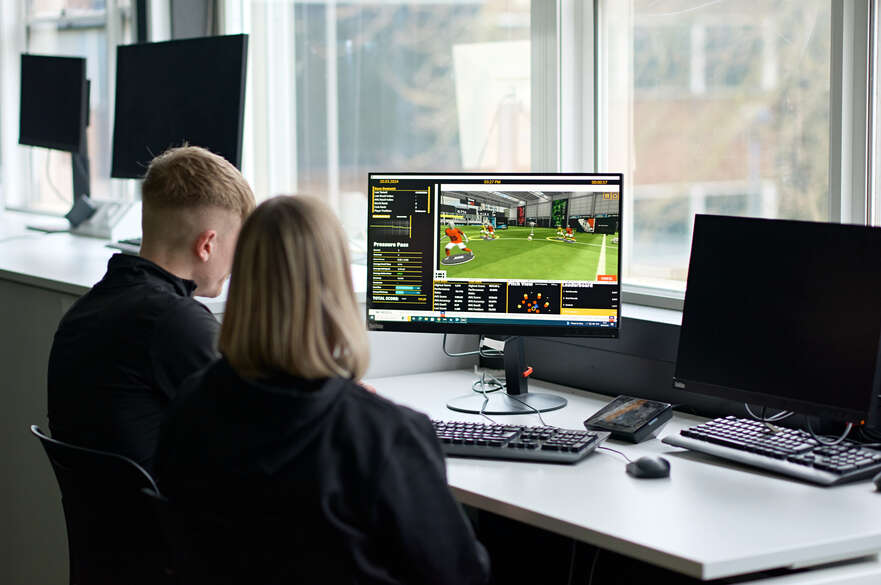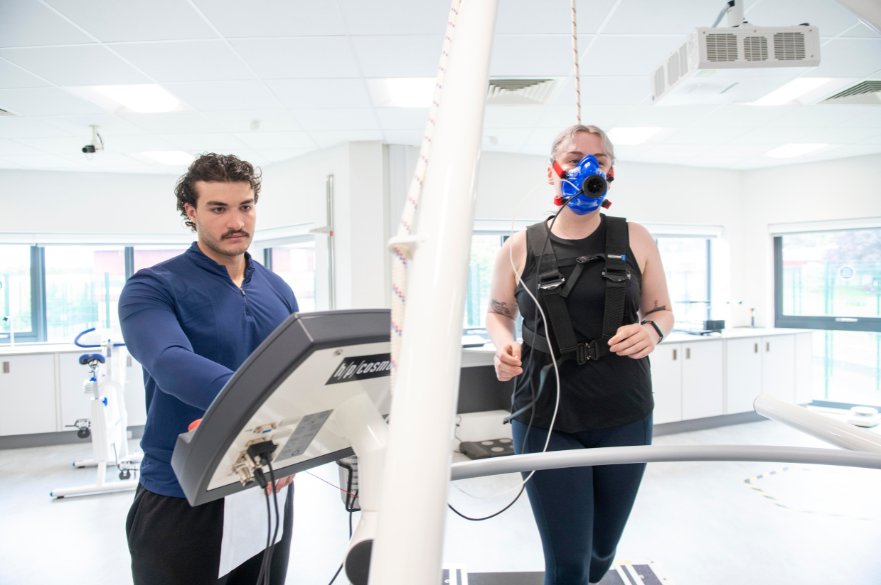This course is in Clearing
Offers from 56 tariff points
About this course
Your foundation year is the start of your journey where you’ll be introduced to scientific aspects of sport, exercise, and physical activity for health. You’ll take part in lots of practical sessions to apply your theory, developing skills sought by employers and preparing you for potential postgraduate study.
This course lets you apply management theory and sport science to the real world, preparing you to become a confident and work-ready graduate.
You’ll study the fundamentals of core sports science alongside sports management. Using this knowledge, we’ll empower you to tackle the performance of sports and leisure organisations. If you’re a budding entrepreneur, we can even support you in developing your business idea.
You'll focus on developing essential management skills and explore the internal and external business environment, sports marketing, and strategic planning. Bringing these together, you’ll work on a business project with one of the sport and leisure organisations in our network, such as Nottingham Forest Football Club, who are also heavily involved in our Sports Marketing module.
Combining the best of sport, exercise science and management, this course will provide you with the knowledge, skills and experience to work at a management level within the sport and leisure industry or beyond.
The course will enable you to explore essential sport science and management topics such as:
- Sport and exercise science, including physiology, psychology and nutrition
- Sports marketing
- Applied strategic business analysis and management
- Event management and entrepreneurship.
Why choose this course?
You have the opportunity to:
- work with leading sport and leisure management professionals
- undertake a management work placement
- engage with various sports and leisure organisations via consultancy projects and lectures.
Chartered institute for the Management of Sport and Physical Activity (CIMSPA)
You’ll have the opportunity to take your CIMSPA Gym Instructor and Personal Trainer qualification alongside your degree.
By becoming part of CIMSPA, which is the largest community of qualified exercise professionals, you not only boost your graduate employability but also create a foundation for ongoing career growth. It's a fantastic way to start your journey in the world of sport science and fitness.
There will be a small fee to register with CIMSPA.
Sport and Wellbeing Academy
Each year a number of our Sport Science students get the chance to work in our Sport and Wellbeing Academy. This exciting opportunity allows you to apply some of the theory you've learned in a real-world environment and develop the skills needed for working in industry. Working alongside our experienced Senior Exercise Practitioners you'll have the opportunity to deliver exercise programmes to help improve the health and wellbeing of the local community.
You can also work with local schools to implement 'The Daily Mile' which improves the fitness and concentration of their pupils. NTU's sports teams are currently in the top ten in the BUCS league (British Universities and Colleges Sport). Our aim is to reach the top and working in the Academy gives you the opportunity to work with our teams on their training, performance and nutrition to make this dream a reality. Find out more about the Academy...
What you’ll study
During your first year you’ll be introduced to key topics in sport and exercise science, such as anatomy and physiology, psychology of health and wellbeing, and current topics in sport. There’s also a focus on developing your academic and professional skills. These are year-long modules which will really set you up for success in your degree and your career after graduation.
You will develop and apply a range of essential, transferable management skills that are greatly valued by employers. This course has received professional recognition for the unique way it combines theory with practical experience.
Fitness, Training and Testing (20 credit points)
Learn how to assess fitness levels, gauge training effectiveness, and pinpoint areas for improvement. Perform these tests, prioritize client needs, and communicate key findings while recommending training techniques for better performance.
Introduction to Anatomy and Physiology (20 cp)
Understand the body's major physiological systems in relation to sport and exercise through practical experiments. You’ll learn anatomical terminology and the locations of organs, muscles, and bones.
Academic Skills for Sport and Exercise Science (20 cp0
Develop your key academic skills such as writing, research, and collaboration. You’ll gain valuable research skills and learn how to critically use and evaluate information sources.
Professional Skills for Sport and Exercise Science (20 cp)
This module runs for the whole of your foundation year and focuses on enhancing your professional skills through learning tasks. It emphasizing the importance of engaging in extra and co-curricular activities for professional growth.
Current Topics in Sport (20 cp)
You’ll be introduced to current topics in sport science, coaching, management, nutrition, and health. Exploring current research, you’ll write a persuasive article that addresses one of the current topics introduced in this module.
Psychology of Health and Wellbeing (20 cp)
Explore the impact of exercise on health and wellbeing in this module. Study evidence showcasing psychological benefits of physical activity. You’ll gain practical insights into applying theories to promote physical activity, focusing on strategies and interventions for improved health and wellbeing.
Introduction to Sport and Exercise Physiology (20 credit points)
This module provides the foundations of the key human systems (anatomical and physiological) and their responses and adaptations to sport and exercise.
Foundations of Sport and Exercise Psychology (20 cp)
Examine the psychological consequences of engaging in sport and exercise and the mental factors that impact quality sport and exercise experiences.
The Internal Business Environment (20 cp)
You will be introduced to key topics such as managers, teams, organisational culture, structure and communication. You will also study academic models and topics of law.
The External Business Environment (20 cp)
You will explore various academic approaches to management. Focusing on the external influences of business, you will learn to use the PESTEL model to analyse an organisation.
Sport Culture and Society: A Critical Introduction (20 cp)
Explore the importance of the social sciences in understanding sports and in the education of every sports professional.
Developing Academic and Research Skills (20 cp)
Get an overall perspective of the research process in the context of sport, exercise, health and leisure management, and learn the research skills necessary to complete your studies.
Core modules:
Professional Practice (20 cp)
Through a short placement, you will learn to apply, analyse and evaluate various vocationally relevant processes, enhancing your employability and preparing you for the world of work.
Strategic Management and Economic Analysis (20 cp)
This module aims to develop your understanding of strategy and resource management and the role these play in establishing competitive advantage. In addition to recognising issues associated with supply and demand, broadcasting and sponsorship and competitive balance.
Sports Marketing and CRM Systems (20 cp)
You are introduced to digital marketing systems and essential customer relationship management (CRM) principles and practices whilst also learning the unique nature of sports marketing.
Integrated Applied and Professional Skills (20 cp)
Using inquiry-based learning, students will continue to learn about the research process and gain an understanding and experience of how research is conducted within the field of sport science and management.
Optional modules - choose two:
Applied Sport and Exercise Physiology (20 cp)
Through theoretical and practical study, you will learn how bouts of physical exercise alter the body’s structures and functions and how these concepts can be applied to training.
Practical Applications in Sport Psychology (20 cp)
This module introduces the concept of evidence-based practice and frameworks of assessment, intervention and evaluation to address issues in sport, coaching, social and exercise psychology.
Sociology of Sport, Health and the Body (20 cp)
Investigate the relationship between sport, exercise, physical activity and health by developing a small research project.
Core modules:
Sport Project and Dissertation (40 cp)
You will produce original and independent work in a specialist area of sports science, coaching, exercise science or sport and leisure management, depending on your focus of study.
Entrepreneurship and Enterprise (20 cp)
Learn about entrepreneurship, critically evaluate business environments, and develop the knowledge, skills and techniques required to create a start-up company business plan effectively.
Economics and Finance in Sport and Leisure Industry (20 cp)
Learn the key theories and apply this knowledge to everyday sport management problems. You’ll cover topics such as pricing strategies, sport analytics, betting markets and financial risk which will assist in your ability to become a leading sport manager in the field.
Optional modules - choose one:
Transforming Sport: Sustainability and Social Justice (20 cp)
Study and challenge the accepted beliefs and practices of those who govern and promote sport. Drawing on a variety of topics, this module presents a case for sport sociology as an agent of positive change in sport.
Advanced Topics in Sport and Exercise Psychology (20 cp)
You will become familiar with selected areas such as motivational climate, athletic identity, mental toughness, psychology of injury and morality in sports. The emphasis of this module will be placed on current primary research.
Strength, Power and Endurance for Sport and Exercise (20 cp)
This module typically focuses on six topics related to applied exercise physiology and strength and conditioning research.
Optional modules - choose one:
Challenging Critical Issues in Sport (20 cp)
You'll analyse complex problems such as sports injury, drug use in sports and inequality and develop potential solutions using positive social changes.
Talent Development in Sport (20 cp)
This module will explore a critical view of the role of talent development in sports, focusing on the psychosocial, environmental, and personal factors that can influence the talent development process.
Event Management in the Sport and Leisure Industry (20 cp)
This module will help you develop your knowledge and skills in all appropriate management functions to plan for, develop and manage an event effectively.
We regularly review and update our course content based on student and employer feedback, ensuring that all of our courses remain current and relevant. This may result in changes to module content or module availability in future years.
Don’t just take our word for it, hear from our students themselves
Video Gallery
How you're taught
You’ll learn through a mix of:
- lectures - covering the key theories
- seminars - smaller-group sessions perfect for learning key skills and collaborative working
- practical sessions - using our extensive range of industry-standard facilities
- workshops - this includes surgery sessions where you’ll meet with your lecturer in small groups to discuss any problems or work through challenging topics.
The rest of your time will be spent carrying out independent study such as reading textbooks and lecture notes, and working on exercises.
Study abroad opportunities
Get ready to embark on an adventure with our study abroad programs at partner universities or by getting a work placement overseas. Both opportunities will boost your employability, build lifelong friendships, and allow you to experience the world in a whole new way.
Research informed teaching
Our research is tackling real-world issues – and the people working on this research will be teaching you. It also informs the subjects you’ll be studying with us so you can be sure your knowledge will be cutting-edge in your field. In the last Research Excellence Framework (REF 2021) - the UK's system for assessing the quality and impact of research in universities - we’re proud that 100% of NTU's Sport and Exercise Sciences, Leisure and Tourism submission was assessed to be world-leading or internationally excellent.
Learn a new language
Alongside your study, you also have the opportunity to learn a new language. The University Language Programme (ULP) is available to all students and gives you the option of learning a new language or improving the skills you already have. Find out more about the ULP.
How you're assessed
People excel in different ways, and we want everybody to have the best possible chance of success. That’s why we’ve adopted a range of assessment types, including:
- coursework, including group projects, case studies, dissertation and other assignments
- practical assessments, such as individual and group presentations, laboratory assessments and reports
- exams and tests, including formal exams, written tests and multiple-choice.
Careers and employability
Your career development
You will develop and apply a range of essential, transferable management skills that are greatly respected by employers.
Our recent BSc (Hons) Sport Science and Management graduates have secured roles at companies including:
- British Swimming
- Norwich City Football Club Academy
- David Lloyd
- Hilton Hotels
- Leicester City and Exeter Football Clubs
They have gone into a wide variety of job roles including:
- Events Officer
- Football Services Officer
- Logistics Manager
- Customer Insight Executive
- Marketing and Promotions Assistant
- Management Trainee
On successful completion of the course, many graduates choose to undertake further study on one of our Masters-level courses or MPhil and PhD research degrees.
Placements
Top 10 for the number of sport science students on year-long placements (HESA 2023/24).
NTU is one of the most employment-focused universities. Increasingly, employers want to recruit graduates who have real-world work experience. That’s why all of our courses, across every subject area, offer you a work experience opportunity. Our experts help build and support your future with various career programmes and events.
On this course, after your second year, you will have the opportunity to take a year's work placement (sandwich placement). This will give you a chance to gain vital experience and put your knowledge into practice. You're also twice as likely to secure a graduate job within six months if you take a work placement.
Our recent Engineering students have taken placements across a wide range of companies, including Leicester Tigers Rugby, Microsoft and Nottingham Forest Academy. They secured varied roles such as Marketing Assistant, Trainee Coach and Learning Support Assistant.
You'll be supported and assessed throughout your placement year and will write a reflective report and diary at the end of your placement. When you complete your placement, you will be eligible to receive an additional award of a Diploma in Professional Practice.
Find out more about work placements.
We have strong links with various leading sports and leisure organisations and professional bodies. You will undertake research and consultancy projects with these organisations, providing you with invaluable industry experience. Many Sports Science and Management students have worked with sporting organisations and clubs such as:
- Nottingham Forest Football Club
- Nottingham Rugby Club
- Nottingham Wildcats Basketball Club
- Derby Rugby Club
- British Olympic Association
- England Hockey
- The Chartered Association of Sport and Exercise Sciences (accredited physiologists)
- The British Psychological Society (sport and exercise psychology division of chartered psychologists)
Our industry partners include:
NTU Enterprise
You'll also have the opportunity to turn your ideas into a viable business with help from NTU Enterprise, NTU's purpose-built Centre for Entrepreneurship and Enterprise, a support centre to help students create, develop and grow their businesses.
Campus and facilities
You’ll mainly be studying in the Erasmus Darwin and CELS Buildings with access to facilities including an environmental chamber, biomechanics lab, and nutrition suite:
We have the stimulating and creative environment needed to equip students with the knowledge and transferable skills to put them ahead of the graduate crowd. We provide first-class facilities that enhance the quality of our education and push the boundaries of our research, these include:
The University has a wide range of sporting and health-related facilities across three of our campuses. You will have access to:
- sport coaching
- sports injury clinics
- fitness suites
- specialist facilities
- more than 40 sports clubs.
Sport, Exercise and Health Physiology Laboratories
Our laboratories are fully equipped with specialist facilities. You will find high-quality, dynamic learning environment to cater for different types of exercise testing and physical activity.
British Olympic Association (BOA) Approved Environmental Chamber
This chamber enables us to simulate climates anywhere in the world, from Everest to Egypt. Olympic athletes have used the chamber to acclimatise to extreme competition environments.
Biomechanics and Performance Analysis Suite
Our Biomechanics and Performance Analysis Suite includes isokinetic and isometric dynamometers for assessment of force produced by muscle groups of the body. You will also find a 3D camera motion analysis system.
Culinary Skills Teaching Kitchen and the Clifton Sports Hub Nutrition Suite
You will have the opportunity to develop your cooking skills and deliver cook and eat sessions in our Culinary Skills Teaching Kitchen and the Clifton Sports Hub Nutrition Suite.
IT, Sport Psychology and Management Suites
The School also features IT, Sport Psychology and Management Suites. These are used for analysing following:
- matches
- statistics
- nutrition
- coaching
You will also have a host of sporting clubs and societies to get involved in.
Your campus
Our self-contained, community-focused Clifton Campus has been designed to keep students busy between lectures. Catch-up with your course mates in the Pavilion’s barista café and Refectory; brainstorm group presentations in chic and stylish study spaces; enjoy some proper R&R in The Point, home of our Students’ Union. The campus also hosts the multimillion-pound Clifton Sports Hub, offering great options for everyone — whatever your interests, and however competitive you’d like to get!
Your city
Take a few steps off campus and you’ll find yourself in the heart of Nottingham — one of Britain’s top 10 student cities, and one of Europe’s top 25. As well as offering a great social scene, it’s one of the UK’s key sporting hubs, home to the iconic Trent Bridge Cricket Ground; Notts County (the world’s oldest professional football league club) and two-time European Cup-winners Nottingham Forest; the Nottingham Tennis Centre, the National Ice Centre, and the National Watersports Centre at Holme Pierrepont; plus rugby union, rugby league, hockey and ice hockey teams.
Entry requirements
This course is in Clearing
Looking for a place in Clearing? We are accepting application and would love to hear from you!
UK students
This course is in Clearing
Looking for a place in Clearing? We are accepting applications and would love to hear from you!
Clearing requirements
From 56 UCAS tariff points from up to 3 qualifications.
To discuss our entry requirements and see what we can offer you, call us now on +44 (0)115 848 6000. Alternatively, if you already have your qualifications, apply online via our Clearing Application form.
Preparing for results day? Beat the queue and sign up for NTU Priority for up-to-date information about all things Clearing. You’ll get an offer ahead of Clearing, subject to you achieving the required grades on results day.
- 56 UCAS Tariff points from three A-level or equivalent
- Other requirements: GCSE - English grade C / 4, Maths grade C / 4 and PE or Science grade C / 4
To find out what qualifications have tariff points, please use our tariff calculator.
Additional requirements for UK students
You may be interested in this course if you want to study sport science but haven’t studied a PE or Science subject at A-level or equivalent, or if you don't meet the entry requirements for BSc (Hons) Sport Science and Management.
Contextual offers
If you don’t quite meet our entry requirements, we might be able to make you a lower offer based on a range of factors, including your background (such as where you live and the school or college you attended), your experiences and your individual circumstances (you may have been in care, for example). This is called a contextual offer, and we get data from UCAS to help make these decisions. We do this because we believe everyone with the potential to succeed at NTU should have the opportunity to do so, no matter what barriers you may face.
Meeting our entry requirements
Hundreds of qualifications in the UK have UCAS Tariff points attached to specific grades, including A-levels, BTECs, T Levels and many more. You can use your grades and points from up to three different qualifications to meet our criteria. Enter your predicted or achieved grades into our Tariff calculator to find out how many points your qualifications are worth.
Other qualifications and experience
NTU welcomes applications from students with non-standard qualifications and learning backgrounds, either for year one entry or for advanced standing beyond the start of a course into year 2 or beyond.
We consider study and/or credit achieved from a similar course at another institution (otherwise known as credit transfer), vocational and professional qualifications, and broader work or life experience.
Our Recognition of Prior Learning and Credit Transfer Policy outlines the process and options available for this route. If you wish to apply via Recognition of Prior Learning, please contact the central Admissions and Enquiries Team who will be able to support you through the process.
Getting in touch
If you need more help or information, get in touch through our enquiry form.
International students
This course is in Clearing
Looking for a place in Clearing? We are accepting applications and would love to hear from you!
Clearing requirements
From 56 UCAS tariff points from up to 3 qualifications.
To discuss our entry requirements and see what we can offer you, call us now on +44 (0)115 848 6000. Alternatively, if you already have your qualifications, apply online via our Clearing Application form.
Preparing for results day? Beat the queue and sign up for NTU Priority for up-to-date information about all things Clearing. You’ll get an offer ahead of Clearing, subject to you achieving the required grades on results day.
- 56 UCAS Tariff points from three A-level or equivalent
- Other requirements: GCSE - English grade C / 4, Maths grade C / 4 and PE or Science grade C / 4
- We accept equivalent qualifications from all over the world. Please check your international entry requirements by country.
- English language requirements: See our English language requirements page for requirements for your subject and information on alternative tests and Pre-sessional English.
Additional requirements for international students
You may be interested in this course if you want to study sport science but haven’t studied a PE or Science subject at A-level or equivalent, or if you don't meet the entry requirements for BSc (Hons) Sport Science and Management.
English language requirements
View our English language requirements for all courses, including alternative English language tests and country qualifications accepted by the University.
If you need help achieving the language requirements, we offer a Pre-Sessional English for Academic Purposes course on our City campus which is an intensive preparation course for academic study at NTU.
Other qualifications and experience
If you have the right level of qualifications, you may be able to start your Bachelors degree at NTU in year 2 or year 3. This is called ‘advanced standing’ entry and is decided on a case-by case basis after our assessment of your qualifications and experience.
You can view our Recognition of Prior Learning and Credit Transfer Policy which outlines the process and options available, such as recognising experiential learning and credit transfer.
Sign up for emails
Sign up to receive regular emails from the International Office. You'll hear about our news, scholarships and any upcoming events in your country with our expert regional teams.
Getting in touch
If you need advice about studying at NTU as an international student or how to apply, our international webpages are a great place to start. If you have any questions about your study options, your international qualifications, experience, grades or other results, please get in touch through our enquiry form. Our international teams are highly experienced in answering queries from students all over the world.
Policies
We strive to make our admissions procedures as fair and clear as possible. To find out more about how we make offers, visit our admissions policies page.



